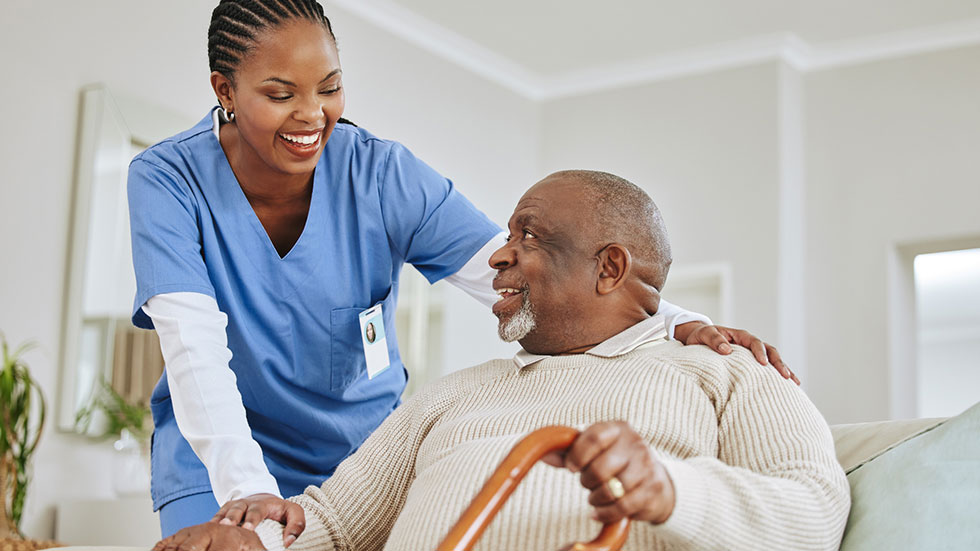10 Things Every Caregiver to an Aging Parent Needs to Know
Essential advice for navigating the challenges of elder care


When parents get older, the responsibility of helping to care for them often falls to their adult children. Parents may need help with yardwork or chores, running errands, or keeping track of appointments or medications for medical conditions. Perhaps they need someone to cook or do laundry, or they need a deeper level of care that may require help from a nurse or aide.
No matter how you help your aging parent, being a caregiver can be difficult, mentally and physically taxing, and emotional. It’s not easy to know your parents are getting older and need more than they once did. But it’s important to remember you’re not alone.
Here are 10 things every caregiver to an aging parent needs to know.

Caregiving should be a team effort
Depending on the level of help your parent needs, caregiving alone can be overwhelming. It’s even more so if you have a family or career of your own you’re trying to balance. In fact, it’s estimated that the average unpaid caregiver spends 3-5 hours per day providing care, requiring you to make room in your current schedule and routine for those hours.
This is why making caregiving a team effort is critical. Be sure to include a healthy spouse, children, and family friends. Create a calendar so your parents know who will be coming when, as well as what they will be doing, and use it for the caregiving team to keep track of dates and tasks as well. Talk together about who prefers to help with what. For example, someone may prefer to do yard work while another is able to grocery shop and cook twice a week.
Having support from family and friends can help ease stress, reduce caregiving costs, and allow for a better situation overall. It can also ensure there’s a back-up plan in the event you are unable to provide care.
Prioritize your own care
Even if you have others helping you with providing care, it’s crucial to also take care of yourself. If you’re not caring for your own well-being, it will be nearly impossible to care for others.
Implement daily physical activity like walks or yoga. Eat a healthy diet and get enough sleep each night. Make time to spend with friends or family doing something relaxing or fun. Schedule time to do your favorite activities or hobbies, or do a self-care activity. Ultimately, do whatever you need to do to give yourself a break and keep yourself physically and mentally fit.
Maintain your relationship with your parents
Don’t focus so much on doing the tasks your parents need help with that you forget to just spend time with them. Lean on your team, or even hire a housekeeper or in-home caregiver for day-to-day tasks so that you can free up some time to just enjoy being with your parents. Or, dedicate a certain period of time each visit or specific day of the week to just be with them and not worry about anything else.
If they are able, take them out to lunch. Go for a drive or a walk. Or simply sit with them in their home. You can even include them in the tasks you’re helping with, such as running errands.

Hire help when you need it
It’s not easy to admit you or your parents need help. However, it’s ok to hire a professional when the time comes. This could be because your parent requires medical care you’re not able to give, or you simply aren’t able to dedicate as much time to caring for their home. Or maybe you need someone to help so that you can have a break.
Start by understanding the factors that affect caregiving costs, such as long-term care insurance and Medicare coverage. Understand your parents’ estate plans. Establish relationships with financial planners, attorneys, and care managers who can help you with their support. Talk to their doctor. These experts can help you understand what you need and give you information to make the best decisions for your loved ones.
Get training for medical tasks
It’s estimated that more than 50% of family caregivers don’t receive training in the medical tasks they’re expected to do, like administering medications, managing incontinence, dressing wounds, or others. If your parent needs basic medical care that you are expected to provide, be sure to talk to their doctor about what you need to do. Or, reach out to their hospital, rehab, or home health nurse to get a better understanding of what to do and how to do it properly.
It’s also critical to understand any chronic diseases your parents may have. Not only does this help you to know what to look out for and anticipate, but it can also help you make better decisions about their care.

Seek out community resources
There are hundreds of resources for caregivers available online or in your community. Check specifically for local Area Agencies on Aging, centers on independent living, and disease-focused groups (like the Alzheimer’s Association).
Whether your loved one receives a diagnosis or simply can’t do things they used to be able to, you don’t have to figure out how to help alone. Not only can you find information online, but you can also ask their doctor, hospital staff, or others you know in the community for resources available to you.
Get access to medical records
HIPAA, or the Health Insurance Portability and Accountability Act, is designed to protect patient privacy. However, it can also provide challenges to families trying to get information they need about a loved one or their care. Make sure you have access to your parent’s medical records, which often requires specific authorization specifying you have access to their medical materials. Or, ensure you’re designated as a durable or health care power of attorney.
Monitor their physical and mental state
Seeing your parent go through physical and behavioral changes as they grow older is difficult. But remember to put yourself in their shoes—a parent who is no longer able to care for themselves and must rely on their adult child.
Cognitive loss can create confusion, which can lead to anger. Your parent may forget things, or you may notice a decline in skills like planning, organizing or decision-making. You may have to monitor their phone and internet usage. And in some cases, you may be responsible for helping to keep them stimulated and engaged.
Recognizing when forgetfulness is something more than being older, or decline in mental function needs more than puzzles, is an important part of caregiving.
You should also monitor their household and surroundings. Perhaps you need to begin making modifications to their home to help them maintain independence, or hire a housekeeper to keep things clean and tidy. Or, maybe it seems your parent is struggling to live at home, so you should consider an independent or assisted living facility to provide additional care.

Share your feelings
Caregiving can lead to a lot of emotions and thoughts. You may feel overwhelmed, stressed, angry, guilty, resentful, frustrated, or sad. It may feel like you want to take these emotions out on your parent, or other loved ones, even though you shouldn’t. But keeping these emotions bottled up isn’t good for you, either.
That’s why it’s important to find a support group, therapist, or friend you can share these feelings with, without judgement.
Caregiving is physical, emotional, and a time investment
Deciding to become a caregiver for an elderly parent may seem like an obvious choice, especially if you feel responsible for doing so, or guilty for not doing so.
However, remember that caregiving can affect you in a lot of ways. It’s physical, often requiring lifting or moving. It’s also emotional, because it’s not easy to see your parent get older and not be able to care for themselves. It’s also a significant time investment, so you’ll need to modify your routine to align with theirs.
All of these efforts can take a toll on you and your family, changing your own routines and taking up your free time. Remember that it’s ok to ask for help, or even hire a professional when you need it. Pace yourself, make time for yourself, and lean on the caregiving team you create for help.
